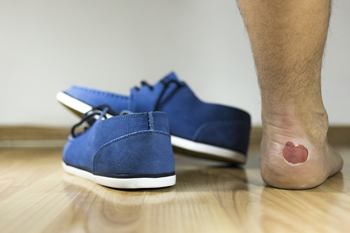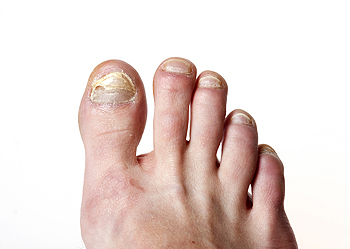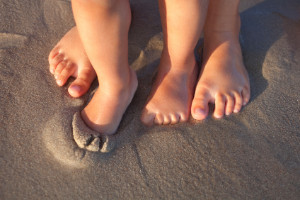What Causes Blisters On The Feet?
 The most common reason blisters develop on the feet is as a result of excessive friction. This may happen from wearing shoes that do not fit correctly, and can cause the top layer of the skin to become raw. A small pocket of fluid will form, which is the body’s natural method in repairing skin that has become damaged. The fluid will generally drain on its own when the healing process has been completed. Many patients find it helpful to cover the affected area with a bandage as daily activities are completed. If you have blisters on your feet that you believe have become infected, it is strongly suggested that you seek the care of a podiatrist who can properly treat this ailment.
The most common reason blisters develop on the feet is as a result of excessive friction. This may happen from wearing shoes that do not fit correctly, and can cause the top layer of the skin to become raw. A small pocket of fluid will form, which is the body’s natural method in repairing skin that has become damaged. The fluid will generally drain on its own when the healing process has been completed. Many patients find it helpful to cover the affected area with a bandage as daily activities are completed. If you have blisters on your feet that you believe have become infected, it is strongly suggested that you seek the care of a podiatrist who can properly treat this ailment.
Blisters are prone to making everyday activities extremely uncomfortable. If your feet are hurting, contact Dr. Steven Shlonsky of Louisville, Kentucky. Dr. Shlonsky can provide the care you need to keep you pain-free and on your feet.
Foot Blisters
Foot blisters develop as a result of constantly wearing tight or ill-fitting footwear. This happens due to the constant rubbing from the shoe, which can often lead to pain.
What Are Foot Blisters?
A foot blister is a small fluid-filled pocket that forms on the upper-most layer of the skin. Blisters are filled with clear fluid and can lead to blood drainage or pus if the area becomes infected.
How Do Blisters Form?
Blisters on the feet are often the result of constant friction of skin and material, usually by shoe rubbing. Walking in sandals, boots, or shoes that don’t fit properly for long periods of time can result in a blister. Having consistent foot moisture and humidity can easily lead to blister formation.
Prevention & Treatment
It is important to properly care for the affected area in order to prevent infection and ease the pain. Do not lance the blister and use a Band-Aid to provide pain relief. Also, be sure to keep your feet dry and wear proper fitting shoes. If you see blood or pus in a blister, seek assistance from a podiatrist.
If you have any questions, please feel free to contact our office located in Louisville, KY . We offer the newest diagnostic and treatment technologies for all your foot care needs.
What Is The Medical Name For Toenail Fungus?
 When the toenails are affected by a fungus, it is medically referred to as onychomycosis. It enters the body and lives underneath the nail. Symptoms may gradually appear, and these can include a distorted nail that lifts off of the nail bed, in addition to the nail becoming thick and discolored. This contagious fungus thrives in moist and warm environments, which can consist of public swimming areas, shower room floors, and locker rooms. There may be pre-existing reasons why this type of fungus may develop. These can include medical conditions such as diabetes, poor circulation, or patients who have a weakened immune system. If you are afflicted with toenail fungus, it is suggested that you are under the care of a podiatrist who can prescribe the correct medication for you.
When the toenails are affected by a fungus, it is medically referred to as onychomycosis. It enters the body and lives underneath the nail. Symptoms may gradually appear, and these can include a distorted nail that lifts off of the nail bed, in addition to the nail becoming thick and discolored. This contagious fungus thrives in moist and warm environments, which can consist of public swimming areas, shower room floors, and locker rooms. There may be pre-existing reasons why this type of fungus may develop. These can include medical conditions such as diabetes, poor circulation, or patients who have a weakened immune system. If you are afflicted with toenail fungus, it is suggested that you are under the care of a podiatrist who can prescribe the correct medication for you.
If left untreated, toenail fungus may spread to other toenails, skin, or even fingernails. If you suspect you have toenail fungus it is important to seek treatment right away. For more information about treatment, contact Dr. Steven Shlonsky of Louisville, Kentucky. Dr. Shlonsky can provide the care you need to keep you pain-free and on your feet.
Symptoms
- Warped or oddly shaped nails
- Yellowish nails
- Loose/separated nail
- Buildup of bits and pieces of nail fragments under the nail
- Brittle, broken, thickened nail
Treatment
If self-care strategies and over-the-counter medications does not help your fungus, your podiatrist may give you a prescription drug instead. Even if you find relief from your toenail fungus symptoms, you may experience a repeat infection in the future.
Prevention
In order to prevent getting toenail fungus in the future, you should always make sure to wash your feet with soap and water. After washing, it is important to dry your feet thoroughly especially in between the toes. When trimming your toenails, be sure to trim straight across instead of in a rounded shape. It is crucial not to cover up discolored nails with nail polish because that will prevent your nail from being able to “breathe”.
In some cases, surgical procedure may be needed to remove the toenail fungus. Consult with your podiatrist about the best treatment options for your case of toenail fungus.
If you have any questions, please feel free to contact our office located in Louisville, KY . We offer the newest diagnostic and treatment technologies for all your foot care needs.
Why Are My Feet Swollen?
 Many women are aware of the numerous aches and pains the body may experience throughout pregnancy. A common area for pain to occur is in the feet. This may be caused by the additional weight that builds during pregnancy, which may affect the arch, causing it to either disappear in the feet, or become extremely low. The feet may roll inward as a result of flat feet, and this may cause significant pain. Relief may be found when appropriate shoes are worn, and it may help to wear custom orthotics. Another common ailment that many pregnant women experience is swollen feet. This happens as a result of increased fluids and blood volume. To lessen the swelling, it may help to avoid foods that have elevated levels of salt, elevate the legs as often as possible, and wear shoes that fit correctly. If you have any questions about how pregnancy can affect the feet, it is suggested that you consult with a podiatrist.
Many women are aware of the numerous aches and pains the body may experience throughout pregnancy. A common area for pain to occur is in the feet. This may be caused by the additional weight that builds during pregnancy, which may affect the arch, causing it to either disappear in the feet, or become extremely low. The feet may roll inward as a result of flat feet, and this may cause significant pain. Relief may be found when appropriate shoes are worn, and it may help to wear custom orthotics. Another common ailment that many pregnant women experience is swollen feet. This happens as a result of increased fluids and blood volume. To lessen the swelling, it may help to avoid foods that have elevated levels of salt, elevate the legs as often as possible, and wear shoes that fit correctly. If you have any questions about how pregnancy can affect the feet, it is suggested that you consult with a podiatrist.
Pregnant women with swollen feet can be treated with a variety of different methods that are readily available. For more information about other cures for swollen feet during pregnancy, consult with Dr. Steven Shlonsky from Louisville, Kentucky. Dr. Shlonsky will attend to all of your foot and ankle needs.
What Foot Problems Can Arise During Pregnancy?
One problem that can occur is overpronation, which occurs when the arch of the foot flattens and tends to roll inward. This can cause pain and discomfort in your heels while you’re walking or even just standing up, trying to support your baby.
Another problem is edema, or swelling in the extremities. This often affects the feet during pregnancy but tends to occur in the later stages.
How Can I Keep My Feet Healthy During Pregnancy?
- Wearing orthotics can provide extra support for the feet and help distribute weight evenly
- Minimize the amount of time spent walking barefoot
- Wear shoes with good arch support
- Wear shoes that allow for good circulation to the feet
- Elevate feet if you experience swelling
- Massage your feet
- Get regular, light exercise, such as walking, to promote blood circulation to the feet
If you have any questions please feel free to contact our office located in Louisville, KY . We offer the newest diagnostic and treatment technologies for all your foot and ankle needs.
Children and Walking Barefoot
 When babies are born, their feet are generally soft and flexible. Research has shown the feet may become stronger when walking is done barefoot while indoors. This may help to strengthen the overall foot as the toes grasp the floor for balance. When the first pair of shoes are purchased, it is helpful that the shoes are made of lightweight and breathable materials. Additionally, there needs to be adequate room at the top of the shoes so the toes can move freely. This may help to prevent ingrown toenails from developing. Good foot hygiene begins with teaching your child how to properly wash and dry their feet, in addition to helping them to stretch their feet. If you would like more information about how to care for children’s feet, please consult with a podiatrist.
When babies are born, their feet are generally soft and flexible. Research has shown the feet may become stronger when walking is done barefoot while indoors. This may help to strengthen the overall foot as the toes grasp the floor for balance. When the first pair of shoes are purchased, it is helpful that the shoes are made of lightweight and breathable materials. Additionally, there needs to be adequate room at the top of the shoes so the toes can move freely. This may help to prevent ingrown toenails from developing. Good foot hygiene begins with teaching your child how to properly wash and dry their feet, in addition to helping them to stretch their feet. If you would like more information about how to care for children’s feet, please consult with a podiatrist.
Making sure that your children maintain good foot health is very important as they grow. If you have any questions, contact Dr. Steven Shlonsky of Louisville, Kentucky. Dr. Shlonsky can provide the care you need to keep you pain-free and on your feet.
Keeping Children's Feet Healthy
Having healthy feet during childhood can help prevent medical problems later in life, namely in the back and legs. As children grow, their feet require different types of care. Here are some things to consider...
Although babies do not walk yet, it is still very important to take care of their feet.
Avoid putting tight shoes or socks on his or her feet.
Allow the baby to stretch and kick his or her feet to feel comfortable.
As a toddler, kids are now on the move and begin to develop differently. At this age, toddlers are getting a feel for walking, so don’t be alarmed if your toddler is unsteady or ‘walks funny’.
As your child gets older, it is important to teach them how to take care of their feet.
Show them proper hygiene to prevent infections such as fungus.
Be watchful for any pain or injury.
Have all injuries checked by a doctor as soon as possible.
Comfortable, protective shoes should always be worn, especially at play.
If you have any questions please feel free to contact our office located in Louisville, KY . We offer the newest diagnostic and treatment technologies for all your foot and ankle needs.








